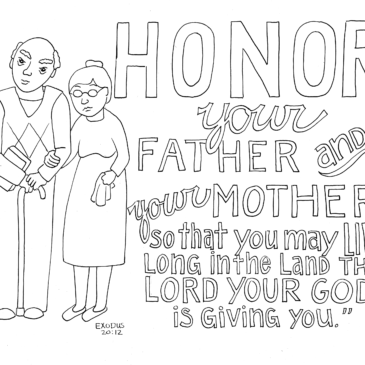

In that sense, we should recognize that the Fifth Commandment forms a “bridge” of sorts between the first four of the Ten Commandments (concerning our relationship with God) and the last six (concerning our relationship with fellow human beings).

As our Creator, God is the Father of us all. If then I am the Father, where is My honor? And if I am a Master, where is My reverence?” (Malachi 1:6).

Notice how God challenged the spiritual leaders of ancient Israel: “A son honors his father, and a servant his master. Remember, four commandments that emphasize the importance of a personal relationship with God precede the commandment to give honor to our parents. The ability of mothers and fathers to succeed in this responsibility depends significantly on how much they, in turn, submit to God’s instruction and teaching and show love and respect for Him. God places the primary responsibility for teaching children the basic principles of life directly on the shoulders of parents. And it all begins with the respect and honor we show our parents. The universal application of this important biblical principle is plain. Honoring others should be a normal, natural habit learned during youth. Learning to obey this commandment helps children establish a lifetime pattern of respecting proper rules, traditions, principles and laws. ‘Honor your father and mother,’ which is the first commandment with promise: ‘that it may be well with you and you may live long on the earth’” (Ephesians 6:2-3). That is why the apostle Paul wrote: “Children, obey your parents in the Lord, for this is right.
#Honor your father and mother verse how to#
It guides us to know how to yield to others, how to properly submit to authority and how to accept the influence of mentors. The Fifth Commandment shows us from whom and how the fundamentals of respect and honor are most effectively learned.

That is the primary focus of the Fifth Commandment-the importance of learning to respect others while we are still children. It is during our formative years that our attitudes governing our personal desires in relation to the desires and needs of others is shaped and molded. Our character, which drives our conduct, begins to form during our childhood. Learning responsibility for our own conduct and character is the beginning of good relationships. It addresses the importance of our learning to treat each other with respect and honor. This Fifth Commandment sets the tone for the last six. They provide us with the guidance we need to remove those roadblocks. They define, with stark clarity, the areas of behavior in which human nature creates the biggest roadblocks to peace and cooperation. We need to learn how to work together harmoniously in every area of life-to build stable, loving, lasting relationships.Īny individual or group-including whole nations-that understands the importance of strong families reaps the reward of an improved relationship with and blessings from God.Įstablishing the rudimentary principles by which workable relationships can be built is the objective of the last six commandments. We desperately need to reverse the horrifying results of our inability to get along with each other. The intensity and magnitude of the violence among ourselves is inexcusable. Our abuse and exploitation of each other is appalling. Six of the commandments-the fifth through the 10th-serve as the standards of conduct in areas of human behavior that generate the most far-reaching consequences on individuals, families, groups and society.
#Honor your father and mother verse series#
The Fifth Commandment introduces us to a series of commandments that define proper relationships with other people. "Honor your father and your mother, that your days may be long upon the land which the Lord your God is giving you" (Exodus 20:12).


 0 kommentar(er)
0 kommentar(er)
